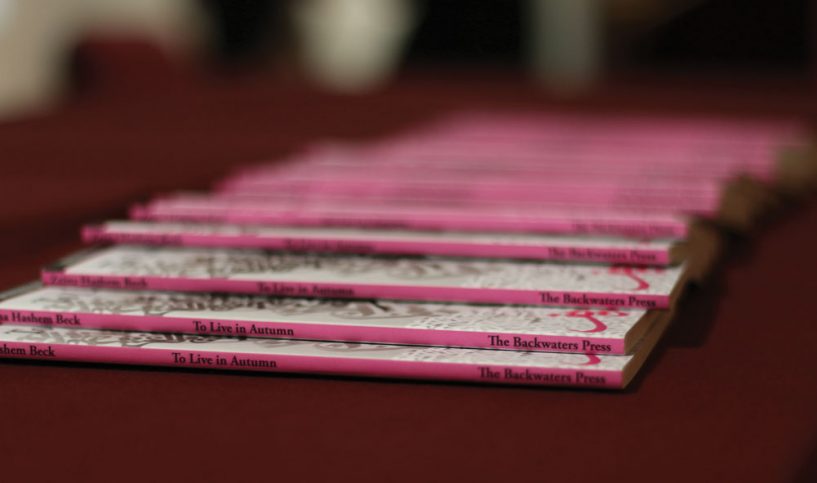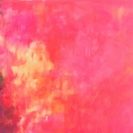In May, poetry lovers in Kuwait had the opportunity to meet Dubai-based Lebanese poet and winner of the 2013 Backwaters Prize, Zeina Hashem Beck, when she was invited by the American University of Kuwait. Zeina, who is also an active performer of her work, took the audience on an evocative trip through a labyrinth of streets, past graffiti and bullet-ridden walls, and into homes of resilient people of Beirut or ‘Byerouth’, as she calls it in one of her poems, “Rewriting Beyrouth.” By the time she finished reading from her debut collection, To Live in Autumn, I felt like I had been on the famed Hamra Street, met Umm Jamal, and passed the homeless ‘Ali’ on Bliss Street –when indeed none of it had ever happened.
Vivid and engrossing are two words that aptly describe Zeina’s potent style of poetry written in simple language. To Live in Autumn is a collection of 45 poems divided into 5 sections, published by the Backwaters Press and launched in September, last year. The book took Zeina around seven years to complete, and drew heavily on memories of Lebanon, especially Beirut, although she claims she did not, at the beginning, consciously set out to write a whole book about the city.
“I was just writing these poems, without realizing that I had written a series of them on Beirut,” says the poet. Yet, the book isn’t entirely nostalgic. While most of the poems in the book were written after Zeina had moved out of Lebanon, ‘Fresco’ was penned while she was still a student studying at the American University of Beirut.
The book was also a runner-up for the Julie Suk Award, a category finalist for the 2015 Eric Hoffer Awards, and it was included on Spilt This Rock’s list of recommended reads for 2014. She has also been nominated for two Pushcart Prizes, most recently, by the prestigious literary magazine Ploughshares.
While in Kuwait, Zeina held workshops, a public lecture at AUK, and a performance at the Amricani Cultural Center for DAI. She mesmerized us with some of her works, including the iconic ‘Ali’ and the audiences’ favourite, ‘Correcting My Mother’s Essay’, which is currently nominated for the Pushcart prize. “This poem has almost become a star. I love it and hate it, because I’m often asked to recite it at readings,” Zeina laughs, adding good-humoredly, “and I’m hoping it will win and not at the same time, because then my mother won’t let me hear the end of it!”
Although writing seriously since 2006, Zeina’s love affair with poetry goes back to her childhood, when, in her own words, ‘memorizing poems was her favorite homework.’ So, did she know she’d become a poet one day? “I can’t say I did,” she replies, candidly. “But my mom always knew. She always repeated, ‘You’ll become a poet one day. I can see it.’”
During our interview, Zeina clarifies that even though the book is about Beirut, it doesn’t idealize the city where she spent her student years. In fact, it is full of contradictions, like the city itself, and is often critical. Zeina highlights its post-Civil War era, streets, beggars, neighbors and their daily life struggles. “To write about a city is also to write about its people,” she explains. As such, many of her poems are portrayals of everyday people, most notably ‘Ali’, which is about the cigarette-wielding homeless man who roamed Bliss Street and was found dead one day because of exposure.
In the poem ‘Spring’, she writes about the Syrian refugees seen on the streets of Beirut ‘selling roses’, which resonates with the sights of children we see in Kuwait selling watermelons by the roadside in sweltering heat; while in ‘Dance’, she leaves us with the haunting words: “we carry cities, instead of angels/on our shoulders, we trail them/behind us like old hurts”.
Zeina says that when she was little, she remembers being moved by Victor Hugo’s poem ‘Demain Dès L’aube’, which is about a father revisiting his daughter’s grave. She also admires T.S. Eliot, Sharon Olds, Dorianne Laux, Richard Blanco, and Naomi Shihab Nye, to name a few. But, she tells me she dislikes the question, “Who is your favorite poet?”
Speaking about her personal writing routine, Zeina says, “I don’t always write every day, but I read daily. I’ve learnt to let the words/ideas simmer in my head, before I pen them down.” I also found Zeina very confident and composed while performing on stage. “I’m a natural performer,” she says, then adds, smiling, “and I practice in front of the mirror. I also carefully choose which poems to perform.”
When asked what she would be, if not a poet? She promptly replied, “Stage actress, or a singer, if I had the voice!”
Undoubtedly, To Live in Autumn is an ode to a city the poet holds dear in her heart. Some of my favorite lines are from the title poem: ‘We’ve burnt in winters,/ listened to the shooting/of words, such empty bullets,/learned to stand/next to open refrigerators doors/to keep our hearts from melting.’ She even autographs copies of her books with the words: “May you carry this city with you.” Indeed, even if you haven’t been to Beirut, you will still feel like you know it in an intimate way.
Zeina, who has had her share of rejections, says, “Poetry is the most beautiful form of writing. It makes people see familiar things in unfamiliar ways. If people read more poetry, the world would be a little bit better.” She is currently working on her second book, but says it’s too early to share details.
To Live in Autumn is available for purchase in Lebanon (Virgin Megastores and AltCity) and Dubai (Kinokuniya, Dubai Mall, and Book Munch Café), as well as online on Amazon, Barnes&Noble, Powell’s Books, and SPD. Zeina Hashem Beck is also the founder of PUNCH, a Dubai-based poetry and open mic collective, and sits on the editorial board of All Roads Will Lead You Home, a new online literary journal by VAC poetry. To follow her, visit Facebook or Twitter @zeinabeck, or check out her website: www.zeinahashembeck.com
Images credit:
©2015 Courtesy of the Office of Public Affairs (American University of Kuwait)
Miral Bushnaq








